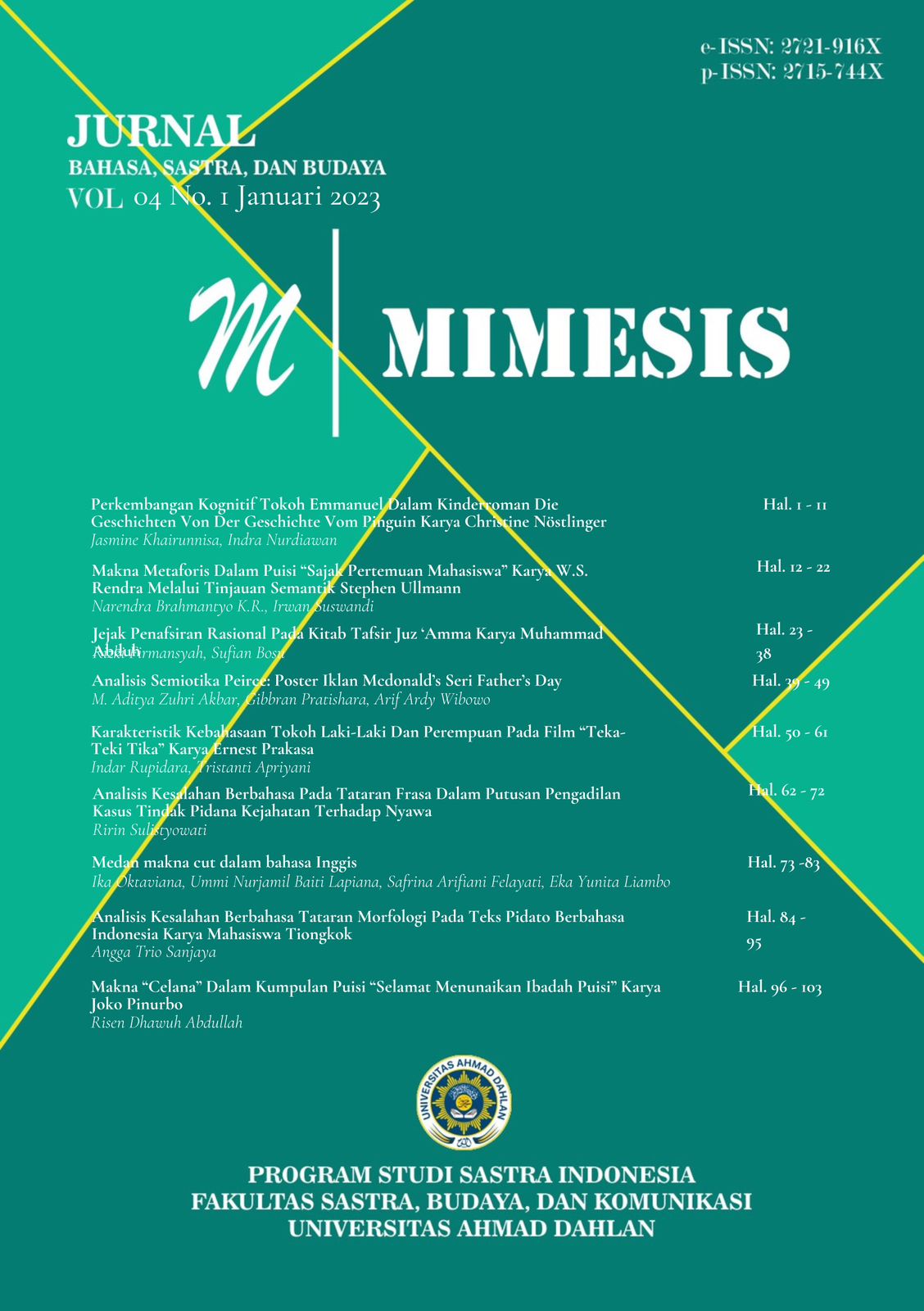JEJAK PENAFSIRAN RASIONAL PADA KITAB TAFSIR JUZ ‘AMMA KARYA MUHAMMAD ABDUH
DOI:
https://doi.org/10.12928/mms.v4i1.7079Keywords:
Juz amma, Muhammad Abduh , Rasiona , TafsirAbstract
Muhammad Abduh is a reformer who is known for the renewal of Islamic thought in various fields. Muhammad Abduh is often aligned with mu'tazilah in the rationality of his thoughts, for him, reason and revelation should not be separated and should not be clashed because both can be used as clues for humans. This basis then became the footing of Abduh's thought in both interpretations, one of which was the interpretation of juz amma. This research is qualitative research with a text analysis approach, the main source of this study is the interpretation of juz amma Muhammad Abduh. The conclusion of this study was found that the interpretation of juz amma Muhammad Abduh has an element of rationality of science and language even with a limited number.
References
Abduh, M. (2001). Tafsir Juz ‘Amma. Terj. Muhammad Bagir. Bandung: Penerbit Mizan.
Ahmad, W. A. W., Abidin, A. F. M. Z., & Mohamed, Y. (2018). Analisis Gambaran Tentang Hari Kiamat Dalam Juzuk Amma. JFatwa: Journal of Fatwa Management and Research, Special Edition, 676-686. https://oarep.usim.edu.my/jspui/handle/123456789/7534
Aini, S &Abdurrahman. (2021). Rasionalitas Perintah Ayat Poligami: Kajian Pemikiran Tafsir Muhammad Abduh. Journal Al-Irfani: Studi Al-Qur’an dan Tafsir, 2(2), 24-45.
Amir, A. N & Tasnim A. R. (2021). The Influence of Muhammad Abduh in Indonesia. International Journal Ihya’ ‘Ulum al-Din, 23(1), 27-59.
Amir, A. N. (2021). Pemikiran Tafsir Shaykh Muhammad Abduh. Jurnal Ilmiah Ilmu Ushuluddin, 20(1), 31-39.
Amir, A. N. (2021). Pengaruh Muhammad Abduh di Kepulauan Melayu Indonesia. Kodifikasia: Jurnal Penelitian Islam, 15(2). 20-30.
Bahri, M. Asri, J, Mitra. (2020). Kajian Pemikiran Tokoh Moderen Muhammmad Abduh (Rekontruksi Pendidikan Islam. PGMI 6(2), 173-182.
Harahap, S. M. (2016). Karakteristik Tafsir Syaikh Muhammad Abduh: Tafsir Yang Berorientasi Pasa Aspek Sastra, Budaya, dan Kemasyarakatan. Yurisprudentia 2(1). 85-98.
Ibrahim, T. (2020). Ummatan Wasatan Dalam Tafsir al-Manar (Penafsiran Muhammad Abduh Terhadap Surat Al-Baqarah: 143). Thesis, Surakarta: UMS.
Ihsan, M. & Ismatul, K. (2021). Ideologi Islam Reformis dalam Tafsir. Syam: Jurnal Iman dan Spiritualitas 2(1), 61-68.
Junaid, J. B. (2021). Kolaborasi Antara Muhammad Abduh dan Muhammad Rasyid Ridha Dalam Menciptakan Kitab Tafsir Bernuansa Adab Ijtimai. JURNAL AL-WAJID 2(2), 449-467.
Kosim, A., Tajudin, N., T. Fuad, W., & Wahya. (2018). Konsepsi Makna Hari Kiamat Dalam Tafsir al-Quran. Al-Bayan: Jurnal Studi Al-Qur’an dan Tafsir 3(2), 119-129.
Masduki, A. (2020). Infiltrasi Paham Wahhabi Dalam Tafsir Al-Manar Karya Rashid Ridha. Ta’wiluna: Jurnal Ilmu Al-Qur’an, Tafsir dan Pemikiran Islam 1(1), 2-15.
Muis, A. (2020). Mengemis Dalam Persfektif al-Quran: Analisis Tafsir Al-Manar Karya Muhammad ‘Abduh dan Muhammad Rasyīd Ridha. al-Warokoh: Jurnal Ushuludin dan Filsafat 4(1), 1-44.
Nasihudin, M. (2020). Menakar Pembaharuan Pendidikan Muhammad Abduh. Al-Lubab: Jurnal Penelitian Pendidikan dan Keagamaan Islam 6(1), 95-106.
Saihu, M. (2020). Tafsir Maqasidi Persfektif Muhammad Abduh dan Muhammad Rasyid Ridho. Mumtaz: Jurnal studi al-Quran dan Keislaman 5(2), 247-258.
Saladin, B. (2020). Reaktualisasi Corak Tafsir Adab Al-Ijtima’I Dalam Menjawab Realitas Sosial Kemasyarakatan dan Perkembangan Zaman. SOPHIST: Jurnal Sosial Politik Kajian Islam dan Tafsir, 2(2), 301-326.
Shofiyulloh, M. M. (2020). Teosantisme Dalam Tafsir Juz Amma Karya Muhammad Abduh (Telaah QS: an-Naziat 1-5. Thesis, Surabaya: UIN Sunan Ampel, Surabaya.
Sufiyana, A. Z, (2021). Pemikiran Pendidikan Muhammad Abduh. Jurnal Pendidikan Islam 4(3), 208-215.
Syafril, A. A, 2019. Tafsir Adabi Ijtima’i: Telaah Atas Pemikiran Tafsir Muhammad Abduh. Jurnal Syahadah, 7(1), 2-12.
Thohir, U. F. (2020). Pemikiran Muhammad Abduh Tentang Politik Hukum, Tauhid, Sosial dan Pendidikan. Humanistika, 6(1), 102-126.
Tim Tafsir Ilmiah Salman. (2014). Tafsir Salman: Tafsir Ilmiah Atas Juz ‘Amma. Bandung: Mizan.
Wahid, M. A. (2020). Teologi Muhammad Abduh. AL-FIKR, 22(1), 71-84.
Zaini, Moh. (2019). The Method of Interpretation Syek Muhammad Abduh and Syeh Rasyid Ridha in The Book Tafsir al-Manar. Jurnal Ilmu Al Qur’an dan Hadist, 2(1), 1-17.
Downloads
Published
Issue
Section
License
Copyright (c) 2023 Sufian Bosu, Rizki Firmansyah

This work is licensed under a Creative Commons Attribution-ShareAlike 4.0 International License.
License and Copyright Agreement
In submitting the manuscript to the journal, the authors certify that:
- They are authorized by their co-authors to enter into these arrangements.
- The work described has not been formally published before, except in the form of an abstract or as part of a published lecture, review, thesis, or overlay journal.
- That it is not under consideration for publication elsewhere,
- That its publication has been approved by all the author(s) and by the responsible authorities tacitly or explicitly of the institutes where the work has been carried out.
- They secure the right to reproduce any material that has already been published or copyrighted elsewhere.
- They agree to the following license and copyright agreement.
Copyright
Authors who publish with Mimesis agree to the following terms:
- Authors retain copyright and grant the journal right of first publication with the work simultaneously licensed under a Creative Commons Attribution License (CC BY-SA 4.0) that allows others to share the work with an acknowledgment of the work's authorship and initial publication in this journal.
- Authors are able to enter into separate, additional contractual arrangements for the non-exclusive distribution of the journal's published version of the work (e.g., post it to an institutional repository or publish it in a book), with an acknowledgment of its initial publication in this journal.
- Authors are permitted and encouraged to post their work online (e.g., in institutional repositories or on their website) prior to and during the submission process, as it can lead to productive exchanges, as well as earlier and greater citation of published work.












